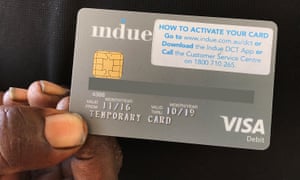Labor frontbencher says proposal makes life harder not only for those on the card but for their local shops and businesses
Tony Burke has given the strongest indication yet that Labor plans to push back against Scott Morrison’s “compassionate conservative” agenda on welfare, as the government flags a national rollout of cashless debit cards.
Just days after reviving the drug testing policy for Newstart recipients which failed to pass the last parliament, the prime minister has told Nine newspapers the government will extend its cashless debit card program, despite the auditor general finding it was “unclear” whether it had any positive impacts.
Labor has so far taken a middle road approach to the cashless debit card program, but speaking to Sky News on Sunday the senior Labor frontbencher said it made life harder, not just for those assigned the card but for the communities they live in.
“Let me tell you a really quick local example as to how this cashless debit card creates real problems,” he said.
“We already know all the challenges about the money provided through
Newstart not being enough for people to be able to make ends meet.
Suburbs like mine, the corner stores, the little small businesses, fruit
and veg shops, butchers massively undercut the major supermarkets on a
whole range of items.Just days after reviving the drug testing policy for Newstart recipients which failed to pass the last parliament, the prime minister has told Nine newspapers the government will extend its cashless debit card program, despite the auditor general finding it was “unclear” whether it had any positive impacts.
Labor has so far taken a middle road approach to the cashless debit card program, but speaking to Sky News on Sunday the senior Labor frontbencher said it made life harder, not just for those assigned the card but for the communities they live in.
“Let me tell you a really quick local example as to how this cashless debit card creates real problems,” he said.
“But the cashless debit card says you can only go to those who’ve signed up. So what does it mean? It means the government will be forcing people away from small businesses to buy products at a higher price, to make it harder for people to make ends meet.
“ Those sorts of examples will be found with people who are not part of this system and retailers that are not part of it are more likely to be small businesses. So they punish the small businesses and they make cost of living even more difficult for the exact group of people who have more cost of living challenges than any other Australians.”
Labor caucus will meet early this week before announcing its final position.
“I’ll leave it to Linda Burney for the final announcement but it’s pretty clear where we’re headed on this,” he said.
“In terms of the government saying there are signs it has worked, I’d say they ought to have a look at what the auditor general’s had to say. The auditor general has been deeply critical of claims that this program is working.”
Australian Council of Social Service’s director of policy, Jacqueline Phillips, said on Sunday: “Cashless debit is unnecessary, expensive, stigmatising and impractical, making it harder for people to buy second-hand goods.
“It costs thousands per person to administer and many people feel humiliated when they have to pay with the card, especially in small towns.
“This can compound the sense of shame many people feel about being unemployed when they are doing all they can to find paid work in today’s competitive job market with one job available for every eight people looking.
“It’s clear that the government is floating these ineffective, expensive policies in a misguided attempt to distract from the urgent need to increase Newstart, which is widely supported and would provide the economy with much-needed stimulus.”
Although the government has announced it is reviving its drug testing policy and expanding the cashless debit card, it has not moved to increase the Newstart rate, despite conservatives such as the former prime minister John Howard admitting the payment was too low.
The finance minister, Mathias Cormann, who remains focused on delivering an operating surplus in next year’s budget, said the allowance, which has not increased in real terms in more than two decades, was never meant as “a replacement wage” and said the government believed it to be “appropriate”.
“In the lead-up to the last election, there were two alternative agendas and neither party promised to increase the Newstart allowance,” he told the ABC.
“Labor went in with $387bn in higher taxes and not one cent of the $387bn in higher taxes was [for] Newstart.
“ … We believe that the rate of the Newstart allowance is appropriate … But we also believe that those Australians who are unemployed, who are on Newstart, and who have a drug addiction problem, that this drug addiction problem is a barrier to them getting back into the workforce. And we want to support and encourage Australians to deal with any barrier that they’re facing … And that is, of course, why we believe that through this drug testing trial that we should assess whether there’s better ways to channel Australians into treatment.”
Jacqui Lambie remains a key vote in attempts by the government to get its drug testing policy through the Senate. The Tasmanian senator has said her support hangs on MPs being drug tested too, which individual parliamentarians have so far said they were open to.

No comments:
Post a Comment